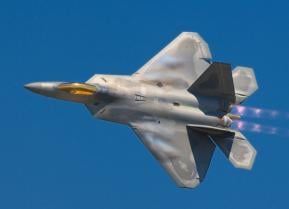The F-22 Is Nearly Unstoppable (But the Air Force Has Too Few of Them)
And the problem can't be fixed.
Building more F-22s is not the answer however. Air Combat Command is working on ways to keep the Raptor relevant into the 2030s and beyond to the end of its service life in the 2060s. That being said, the F-22 will be increasingly challenged by enemy forces as time goes on as new air defenses and new fighters emerge from development.
With the U.S. Air Force considering the retirement of the Boeing F-15C Eagle, Lockheed Martin’s stealthy fifth-generation F-22 Raptor will be the only air superiority fighter in the service’s inventory.
While there is no doubt that the Raptor is far and away the best air superiority fighter ever built, the U.S. Air Force only has about 186 surviving Raptors in its inventory. Of those 186 remaining Raptors, only 123 are “combat-coded” aircraft with another twenty that are classified as backup aircraft inventory machines. The rest are test and training assets. Even then, some of those aircraft are undergoing long-term repairs after suffering from accidents—such as one Alaska-based aircraft that made a belly-landing in Florida in April —and are not flying.
(This first appeared several years ago.)
In total, there are only six front line F-22 squadrons—rather than the required 10—all of which have fewer aircraft than a normal fighter unit. Five of those squadrons have 21 primary authorized aircraft and two backup inventory jets while one operational Hawaii Air National Guard unit has 18 primary authorized aircraft and two backup jets. Test and training units are also shortchanged—with the Weapons School and the elite 422nd Test and Evaluation Squadron being forced to share roughly a dozen jets at Nellis Air Force Base, Nevada.
By comparison, a full strength fighter squadron typically has 24 primary authorized aircraft and three backup jets. This is the model that is most efficient to ensure smooth and cost effective operations at a fighter squadron and is standard for the majority of F-15, F-16 and F-35 units.
Moreover, with the exception of the F-22 community, which has a shortage of aircraft, other fighter mission design series have enough aircraft available to fully equip test and training units with a full complement of aircraft—and where the loss of a single jet does not significantly impact the capability of the entire force.
Unfortunately, because there are so few F-22s in the Air Force inventory and so few combat-coded squadrons, the ops tempo for these units is extremely high.
Indeed, as Russia and China step up to challenge the United States in today’s emergent great power competition, the demands placed on the Air Force’s F-22 fleet will only increase. The simple fact of the matter is that there are not enough F-22s available and the Air Force likely needs more dedicated air superiority assets.
Building more F-22s is not the answer however. Air Combat Command is working on ways to keep the Raptor relevant into the 2030s and beyond to the end of its service life in the 2060s. That being said, the F-22 will be increasingly challenged by enemy forces as time goes on as new air defenses and new fighters emerge from development.
Potential adversaries like Russia and China are designing measures to defeat the Raptor and American air superiority writ large. What might happen is that the F-22 would partner with the sixth-generation Penetrating Counter Air (PCA) in a teaming arrangement similar to today’s partnership between fourth and fifth-generation aircraft. The Raptor would take the place of the F-15C Eagle as the lower-tier of a high-low mix with the PCA forming the upper-tier.
Recommended: Why an F-22 Raptor Would Crush an F-35 in a 'Dogfight'
Recommended: Air War: Stealth F-22 Raptor vs. F-14 Tomcat (That Iran Still Flies)
Recommended: A New Report Reveals Why There Won't Be Any 'New' F-22 Raptors
“When the PCA comes online, it will be designed to operate and be interoperable with fifth-generation aircraft such as the F-22 and F-35,” Tom McIntyre, a program analyst for F-22 requirements at Air Combat Command, told The National Interest some time ago.
“There will come a time whether it is 2030, 2040 or 2050 when the F-22 will be kind of like a fourth-generation aircraft today.”
The Air Force needs to get on with developing and fielding the PCA as soon as possible.
Dave Majumdar is the defense editor for The National Interest. You can follow him on Twitter: @davemajumdar.


